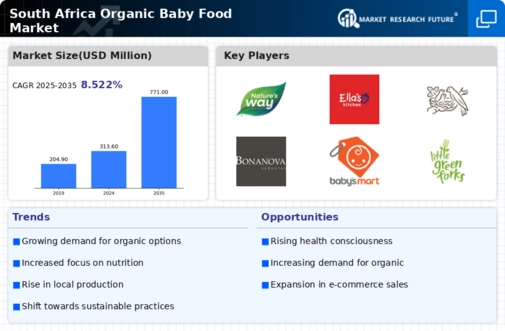The South Africa Organic Baby Food Market has exhibited significant growth, reflecting a rising awareness regarding the nutritional needs of infants and toddlers among parents. This market is characterized by a combination of established brands and emerging players, each striving to capture consumer attention through unique product offerings and innovative marketing strategies.
With trends leaning towards organic and health-focused options, the competitive landscape is increasingly shaped by the demand for high-quality ingredients, transparency in sourcing, and eco-friendly packaging.
Companies in this space are also challenged to stay on top of the shifting preferences of health-conscious consumers, developing products that not only cater to nutritional standards but also align with ethical practices.
Given the burgeoning interest in organic baby foods within the region, both new entrants and established firms are investing in research and development to bring suitable options to market, enhancing their competitive positioning.
Bumps and Babes has established itself as a prominent player in the South Africa Organic Baby Food Market through its commitment to providing high-quality, organically sourced baby food products. The brand has garnered a loyal customer base by emphasizing nutritional integrity and the absence of artificial additives in its offerings.
Its ability to resonate with health-conscious parents has contributed to its strong presence in the market. Bumps and Babes focuses on catering to the needs of modern families, understanding that convenience is key; thus, it offers a variety of ready-to-eat organic baby food options that simplify meal preparation for parents.
With a flexible distribution strategy that includes both online and offline channels, the brand effectively reaches a wide demographic, ensuring availability of its products across various platforms. Nature's Way has carved out a distinctive niche in the South Africa Organic Baby Food Market, known for its extensive range of organic baby food options.
The company's product portfolio includes various purees and cereals that are rich in nutrients and designed for the developmental stages of infants. Nature's Way stands out for its commitment to sustainable sourcing and high-quality standards, which appeal to health-conscious South African parents.
The brand's strength lies in its strong brand reputation for safety and quality, supported by numerous partnerships with local farmers to ensure fresh supply chains. Furthermore, Nature's Way has strategically engaged in mergers and acquisitions to bolster its market presence, aligning itself with other entities focused on organic products and expanding its distribution capabilities.
By continually innovating its product line and maintaining a strong focus on customer engagement, Nature's Way reinforces its position in the competitive landscape of organic baby food in South Africa.






















Leave a Comment